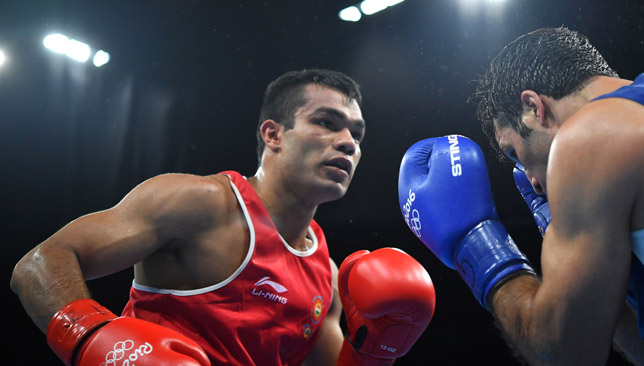
Pitted against Uzbekistan’s Bektemir Melikuziev in the quarter-finals of the middle-weight (75 kg) category, Indian boxer Vikas Krishan had had several demons to overcome in order to defeat his opponent and ensure his country of an elusive Olympic medal.
At 20, Melikuziev is four years younger than Krishan but having faced him in the Asian Championships last year, he had no qualms about admitting the skills of the Uzbek before the encounter. He even went as far as predicting he could claim gold if he managed to beat Melikuziev.
On Monday night, Krishan’s fears materialised before him. He struggled to find answers to the Uzbek’s questions and was left rattled by his opponent’s fleet of foot aggression. Krishan gave a good fight, but his helplessness was captured as his mouth guard was flung from his mouth after a rasping Melikuziev punch.
With Melikuziev on the verge of victory at two rounds to none, Krishan needed a knockout to turn things in his favour. His desperation, though, left him vulnerable and Melikuziev took advantage to land a series of decisive blows and seal the bout 3-0.
Speaking about the loss, Krishan was candid about lack of preparations.
“I always have a problem with a southpaw, whether it was in the last Olympic Games or in the qualifiers for Rio,” he said, “I knew that he would play the second round very fast. There was a lot of difference in power strokes between the two of us.”
Indeed, being a southpaw is not the most rewarding in a country like India.
India's quest for medal in boxing at #OlympicGames ends with Vikas Krishnan's exit #ITVideohttps://t.co/PlEvTjk2By
— India Today (@IndiaToday) August 16, 2016
“I did some practice against southpaws, but in India you hardly find such boxers. There are less than five per cent of them. I didn’t find any at my level.”
Another reason put forward by the pugilist is the administrative debacle that shook the boxing world and resulted in the Indian federation’s banning in 2012 following allegations of corruption and electoral manipulations. Krishan, however, stopped short of laying the blame for his defeat at someone else’s door and took full responsibility.
“We have a handful of opportunities,” he said. “We used to train with Kazakhstan and Uzbekistan but with the ban on federation we lost the opportunity and nobody called us. But I am not blaming the Federation; I lost because of my mistakes. I may have trained less than him.”
The sheer number of Indians qualifying for this year’s Olympics – three, in contrast to seven men and one woman in 2012 – should illustrate the affect of the country’s controversy on boxing in India. Not only had they lost out on international exposure, but they’d also seen their preparations hampered.
Indian boxing has suffered greatly over recent years, the ultimate consequence being a disastrous campaign at Rio. With Shiva Thapa (56 kg) and Manoj Kumar (64 kg) already ousted from the competition, Krishan’s defeat drew a conclusion to medal hopes for the country in boxing this time around.